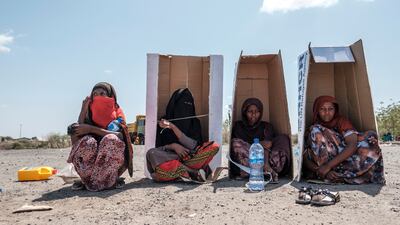Fighting in northern Ethiopia's Afar region has “engulfed” a camp for refugees from neighbouring Eritrea, the UN said on Friday, killing five people and forcing thousands to flee.
The attack earlier this month is the latest blow to the more than 100,000 Eritrean refugees living in Ethiopia, whose camps have been repeatedly caught up in a 15-month war.
It also highlights the growing toll of fighting in Afar, which has emerged in recent weeks as the most active front in the conflict pitting Prime Minister Abiy Ahmed's government against the Tigray People's Liberation Front rebel group.
Residents of the Bahrale camp attack in Afar reported that “at least five refugees were killed and several women were kidnapped”, after armed men entered on February 3, the UN refugee agency said.
“Family members lost one another in the chaos of fleeing the camp,” UNHCR said.
Bahrale camp is situated near the border between Afar and Tigray — the home region of the rebels.
The TPLF controls most of Tigray and in January announced it had expanded operations into Afar, claiming it had been provoked by attacks on its positions by pro-government forces.
UNHCR did not specify which forces the residents had accused of targeting the camp.
However, AFP interviewed several survivors this week in the Afar capital Semera who claimed the TPLF was responsible.
“I had never seen anything like that,” refugee Mahamooda Ahmed said, describing an assault on civilians, with no pro-government combatants in the area.
“I had never seen soldiers open fire on civilians. There were no soldiers for them to fight. It was civilians, including women and children. And they were using very heavy weapons.”
He said two of his seven children — a boy of 6 and a girl of 4 — are unaccounted for, along with one of his two wives.
Afar regional government officials and the national Refugees and Returnees Service said the TPLF was to blame.
But a TPLF spokesman said government officials were “full of lies” and that Eritrean refugees “were not attacked".
“Our forces only targeted armed troublemakers from the Afar government and Eritrean mercenaries,” Kindeya Gebrehiwot said.
These claims could not be independently verified.
Ethiopia's war broke out in November 2020 when Mr Abiy sent troops into Tigray to topple the TPLF, a move he said came in response to TPLF attacks on army camps.
From the outset, Eritrean refugees were caught in the crossfire: Two camps in northern Tigray — Hitsats and Shimelba — were looted and then completely destroyed in what one aid group called a “rampage".
Eritrean forces — which have backed Mr Abiy in the war — and Tigrayan militias, were accused of killing and raping refugees, and thousands of the camps' inhabitants remain unaccounted for.
Last July two other camps in Tigray — Mai Aini and Adi Harush — were caught up in fighting.
The attack on Bahrale marks the first time a camp outside Tigray has been affected.
Established in 2009, the camp housed nearly 21,000 refugees in December 2021, according to the UN, with more than 13,000 additional refugees living in surrounding districts.
More than 4,000 refugees from Bahrale have reached Semera, the UN said Friday.
AFP this week saw hundreds of refugees gathered on the grounds of a closed luxury hotel, some using cardboard boxes as shelter from the sun.
Around 10,000 more refugees are reported to be living in the town of Afdera, 225 kilometres from Semera, the UN said, with others scattered elsewhere.
“We condemn the attack on the refugee camp and reiterate the call for cessation of hostilities to avoid further destruction and potential loss of life for refugees and Ethiopians alike, and so that much needed humanitarian assistance can reach them,” UNHCR said.




















